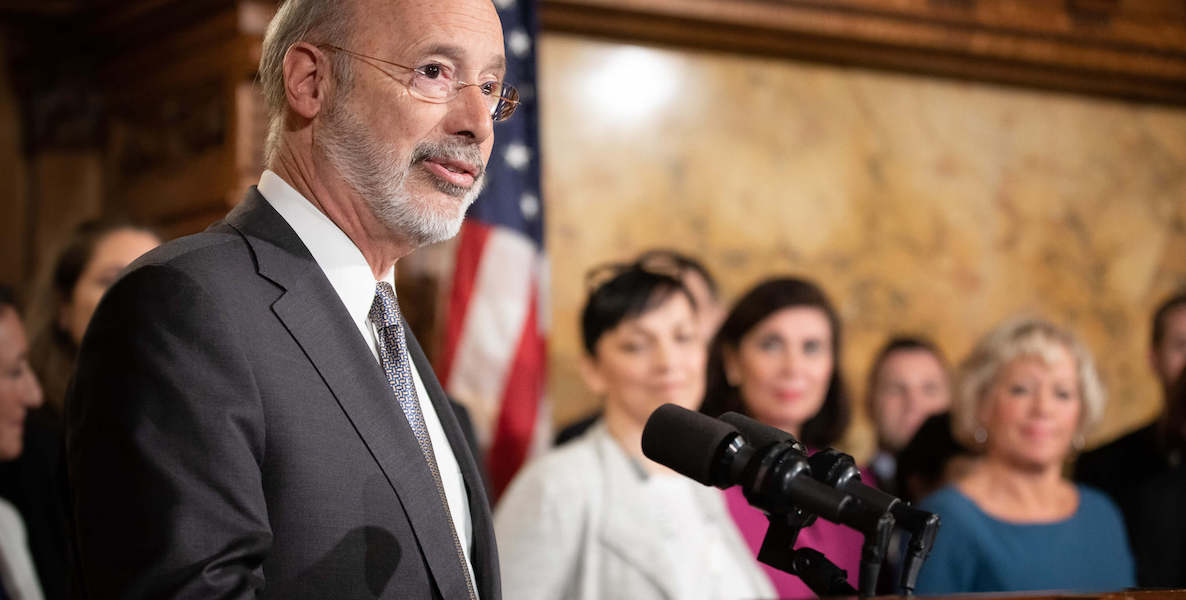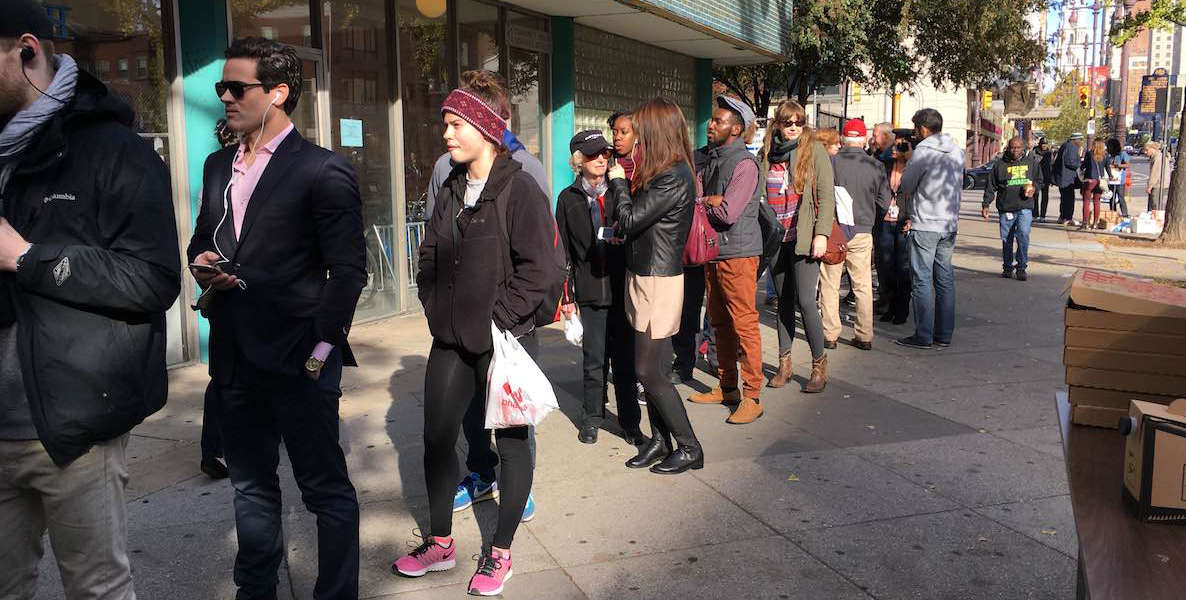Amidst the hysteria about national policy change, and the squabbles about local politics, there is one thing that has been consistently overlooked: The very unsexy but couldn’t-be-more-important issue of the 2018 governor’s race in Pennsylvania.
There’s a lot riding on Governor Tom Wolf, who sits at the top of the 2018 ticket and whose approval rating is an unimpressive 38 percent. Watch this domino effect: If Wolf fails to persuade voters he’s worthy, there’s a good chance he’ll take Senator Bob Casey and the state’s whole Democratic party down with him, since people tend to vote along party lines.
The result most likely will be felt locally in Philadelphia, where the city’s progressive public, private and civic sectors is at odds with current Republican ideology. But this election could have ramifications for the rest of the country, too. While Trump was the first Republican to win Pennsylvania since 1988, no Democrat has won the presidency without Pennsylvania’s electoral college votes since Harry S. Truman in 1948, when the political landscape was such that a Democratic candidate was able to win states like Texas and Georgia, and a third-party candidate, Strom Thurmond, was able to win four southern states. If currently-purple Pennsylvania turns full-on-red in 2018, it’s pretty unlikely a Democrat could win the presidency in 2020.
To recap: Tom Wolf—not Trump, not Pat Toomey, not the 197th ward, not Seth Williams—should be the focus of our attention. And yet, not only are the media failing to focus on Wolf, but Wolf himself seems unaware of how pivotal his reelection will be. Where is he? What’s he been up to lately? What are the cornerstones of the Wolf administration that people can point to that make him worthy of being reelected? Quick, inspiring answers do not come readily to mind. A sundry review of Wolf’s official blog does not give plentiful answers, though it does have a recipe for the Wolf family apple crisp.
Maybe Wolf doesn’t want to be governor anymore. That would explain why he’s kept such a low, lackluster profile and failed to accomplish most of the reforms and programs he promised in 2014. If that’s the case, it’s time to open up the field and give other candidates a shot at winning. Otherwise 2018 could be a repeat of the 2016 election—with Philadelphia and Pennsylvania the ultimate losers.
Wolf finds himself in a situation that reminds me of Hillary Clinton a year before the election: the presumptive candidate, who loyal Democrats will have to vote for even if they don’t get excited by him. By contrast, Republicans may have a competitive primary season at the state level (much as they did at the national level in 2016) that will draw attention to their party, and also encourage greater registration of Republican voters. Meanwhile, Democrats will hope that someone who upholds core tenets of the party will be enough to convince voters. But it won’t. As we found with Clinton, a failure to engage people beyond the most loyal base results in hundreds of thousands of registered voters who, unmotivated by the stakes, will withhold their votes.
If Wolf is the leading gubernatorial candidate whose platform is progressive, empathetic, and pro-government (i.e. in line with Philadelphia’s values) he’ll need to do a few things to increase his chances of getting re-elected.
First, it’s assumed that Philadelphia and Pittsburgh will vote for Wolf, but as we learned with Clinton, urban districts can’t be counted on to carry the state. When they aren’t activated, they won’t issue enough votes to outweigh suburban and rural areas. In another column for The Citizen, I noted that Bucks and Montgomery county issued nearly 68,000 more votes in the 2016 election than Philadelphia County, despite having 100,000 fewer people. This suburban/rural advantage nullifies whatever boost cities have in terms of population, media influence, and GDP.
Low urban voter turnout might lead Wolf to think that he should spend his time outside cities, but on the contrary, Philadelphia and Pittsburgh combined have about a quarter of Pennsylvania’s total registered voter count. It’s far more efficient to focus on these cities.
That said, many people in Philadelphia and Pittsburgh need a reminder of what Wolf has done to support, rather than thwart, these cities. Most media headlines talk about a decline in state funding for education and a failed attempt to wrangle taxes for fracking. Wolf can point to $300 million he allotted the Port of Philadelphia, working with the state legislature to approve Uber and Lyft in the state, and some modest improvements in liquor reform. If we’re talking pure strategy, Wolf should spend more time with popular Mayors Kenney and Peduto, photo-opping at projects and programs that wouldn’t be possible without state support, such as the new construction at the Reading Viaduct or the expansion of the Pittsburgh Zoo.
These are hardly radical improvements. But there’s no doubt Wolf has been better to Philadelphia than former Gov. Tom Corbett, who, for example, slashed $1 billion from the state’s education funding, removed its funding formula, and then reduced Philadelphia’s education funding by 20 percent while raising it by 4 percent in all other Pennsylvania counties.
But this message gets lost when Wolf epitomizes partisan standoffs due to the annual state budget fiasco. At a time when Dems are trying to own the vision of government as an efficient, supportive, market-correcting force in public life, Wolf needs to show that he can make Harrisburg functional again and make painful compromises to pass the 2017 budget quickly.
The last budget blockade made Wolf, ironically, the enemy of many of his supporters. Everyone from nonprofits to real estate developers who depended on state dollars to do things ranging from paying employees to constructing buildings ended up getting burned by government gridlock. Wolf needs to recognize that he came into office promising a get-things-done businessman-like work ethos, but failed on that account. He needs to show he’s learned something in his first term and will be able to wrangle Harrisburg in his second term.
To that end, Wolf needs to show that he stands for more than just bitter partisan politics. Lately Wolf has been talking about raising the minimum wage, an initiative that everyone from the working poor to the liberal elite can get behind. Wolf should take this message on the road, building it into an issue that has an unstoppable momentum of its own.
Wolf needs to recognize that he came into office promising a get-things-done businessman-like work ethos, but failed on that account. He needs to show he’s learned something in his first term and will be able to wrangle Harrisburg in his second term.
Another topic that he can own is the environment. While Democrats typically talk about this issue in terms of climate change, Wolf might do better by talking about it as a business issue. He might even borrow Trump rhetoric to talk about the “bad deal” Pennsylvania has gotten from oil and gas companies, wherein companies have been able to frack and process fuel, creating poisonous emissions and threatening our water supply, with no added tax.
Finally, and again piggybacking on Wolf’s reputation as a businessman, Pennsylvania needs to do more as a state to attract new businesses and new people. On Forbes’ 2016 list of best states for business, Pennsylvania ranked 38th. While many Philadelphians celebrate the city’s resurgence, it’s worth noting both that Philadelphia had more people living in the city in 1990 than today, and Pennsylvania ranks 42nd among US states for population growth.
What Pennsylvania does have is an overabundance of universities, and it is barely using them to its advantage in terms of retaining a young, ambitious workforce or building businesses within the state. Wolf should propose a plan to retain college graduates for another four years in the state, and do more to keep Wharton grads, who routinely move from Philadelphia to New York or Silicon Valley, only to earn their millions in other cities. By creating incentives for new entrepreneurs who can create 10 or more jobs (it’s harder than it sounds for a start-up), Wolf might encourage grads from all universities to stay and build their businesses here.
These are just suggestions. Wolf needs to own his own message, to get some badly needed attention and traction among apathetic voters. Then again, maybe Wolf doesn’t want to be governor anymore. That would explain why he’s kept such a low, lackluster profile and failed to accomplish most of the reforms and programs he promised in 2014. If that’s the case, Josh Shapiro, Eugene DePasquale, Mike Stack, Joe Torsella and others would probably love to have his job, but wouldn’t run against Wolf in the primary. November 2018 feels like it’s far away, but if Wolf is having second thoughts about running again, it’s time to open up the field and give other candidates a shot at winning. Otherwise 2018 could be a repeat of the 2016 election—with Philadelphia and Pennsylvania the ultimate losers.
Photo courtesy Governor Tom Wolf Flickr







